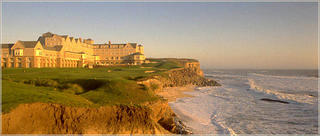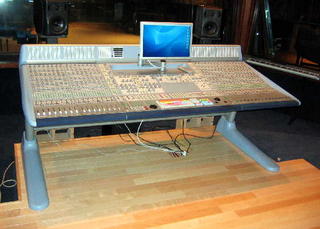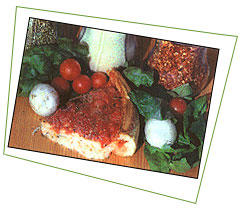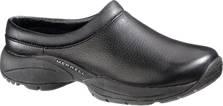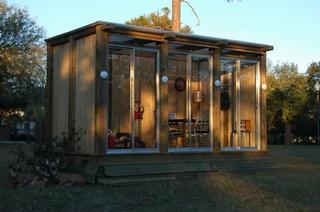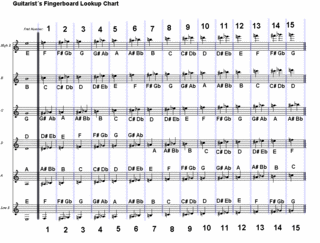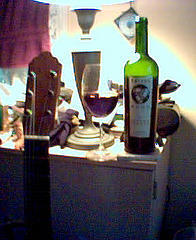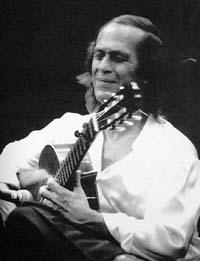Well its been some time since I have writtin something. I have been impressed by how this wifi stuff works, and considering that my father was one of the orginal engeiners that developed this tech at IEEE with Bel Labs at that time 30 years ago. Im now using it to communite with folks like you on the web. I am in a cofie shop Orphas in Hillsbrough NJ near where I work in Princeton and Im connected on the net. Its great and some folks like hear at Orphas off of 206 offer Wifi connection for free, as well as Panaras Bread in Lawerncevill and Princeton NJ. Starbucks at Hot Spot i belive is 30.00-40.00 a month. well enugh of that. I am using a new program called Garage Band you can get this from Mac for 60.00 and its inculded in iLife or I think it comes with all new mac computer purcases. Its a smaller stramed down verison of Logic 7 wich was a program from a company called esonic I belive, and mac bought the program and company I bleive two years ago. Well for me who is just learing how to use all this computer suff its easy and fun. You do need to read the manual a bit but its no big deal. you can check out some of the songs I will be recording on www.victortarassov.com and you can hear what it sounds like. In the program you can record with mic's or there are keyboard, drums, and amp simulations. all kinds of sounds that are pluged into the program, you can also purcase add on's for less than a hundred dollars, I dont have any but its a very cool concept. Work has been going well at PH I still work 10 hours a day but then I get three days off. I was able to have breakfast with my daughter yesterday and that was nice. Well Im going to go for now and I will try to write more as now I have no excuse my computer works and I can hook up to the web.
Peace be with you all,
Victor
20050928
20050927
20050926
Wine Crush at St. Francis in Sonoma CA
CRUSH 2005 BEGAN TODAY AT ST. FRANCIS WINERY
Our latest Harvest in recent years got underway when Tom called early this morning to confirm that about 20 tons of Chardonnay would be handpicked at midday and delivered to the Winery by 3 pm. Upon hearing the one truck of the day roll in, about 30 of us from the Cellar, Lab, Vineyard and Office gathered on the Crush Pad to welcome our first grapes of 2005, which were clean, golden and ripe.
The weekend's warm Sonoma winds helped raise sugar levels toward optimum ripeness on Chardonnay grapes, putting Chardonnay predictably ahead of red wine grapes in terms of readiness for picking. We expect that much of our Chardonnay will be picked and crushed before we begin picking Zinfandel, Syrah, Merlot, and Cabernet Sauvignon in earnest. Forecasts of warm weather this week should enable us to finish picking all 45 acres of our St. Francis Lagomarsino Estate Chardonnay by the end of next week.
The long, cool growing season of 2005 stands in stark contrast to the many heat spikes of 2004, which brought us last year's early harvest on August 18th. Indeed, recent warm days follow a cool growing season with unusual rains that didn't end until mid-June (as opposed to mid-April in most years). However, the talk in the Valley is that flavors of the many grapes still hanging may well reward our patience this year. While degrees Brix, or sugar levels, have usually preceded full flavor for picking during Sonoma's typically hot summers of recent years, the slow, steady ripening we are now observing can mean intense, complex flavors that arrive even before the grapes are ripe for picking.
This "flavors first, sugars second" scenario of a cool, slow ripening season like 2005 can result in wines of noticeable depth and complexity. I observed this firsthand when we visited our Behler Estate Merlot Vineyard here in Sonoma Valley on September 2nd. Though Dino reminded us that the sugar levels, or degrees Brix, were only 19 or 20 degrees on that date (and certainly weeks away from the optimum 25 degrees range for picking), the Merlot grapes were already plump, blackish red in color, and sweet tasting. Dino is quick to note that we couldn't grow grapes quite like these anywhere else. Every harvest brings new lessons, new surprises, reminding us each year that we still have much to learn.
About a hundred years ago, Jack London wrote passionately of the “dreams and mysteries” of the people who lived here in Sonoma Valley. Those dreams and mysteries were usually tied to farming. Indeed, in the years preceding his death in 1916 at the age of 40, London was never more moving, nor more prolific, than when he wrote of the Harvest:
"I ride over my beautiful ranch... The air is wine. The grapes on a score of rolling hills are red with autumn flame. Across Sonoma Mountain, wisps of sea fog are stealing. The afternoon sun smolders in the drowsy sky. I have everything to make me glad I am alive."Jack London, John Barleycorn (1913)
In our time, as both farmers and winemakers, Crush in Sonoma is the enduring highlight of our work at St. Francis. The dreams and mysteries of every Harvest create that moment each year when nature, talent, and hard work come together and inspire in each of us, with great passion, the promise of making something even better than before.
All of us at St. Francis Winery & Vineyards wish you the very best, at this and every Harvest.
CHRISTOPHER W. SILVA President & CEO
Our latest Harvest in recent years got underway when Tom called early this morning to confirm that about 20 tons of Chardonnay would be handpicked at midday and delivered to the Winery by 3 pm. Upon hearing the one truck of the day roll in, about 30 of us from the Cellar, Lab, Vineyard and Office gathered on the Crush Pad to welcome our first grapes of 2005, which were clean, golden and ripe.
The weekend's warm Sonoma winds helped raise sugar levels toward optimum ripeness on Chardonnay grapes, putting Chardonnay predictably ahead of red wine grapes in terms of readiness for picking. We expect that much of our Chardonnay will be picked and crushed before we begin picking Zinfandel, Syrah, Merlot, and Cabernet Sauvignon in earnest. Forecasts of warm weather this week should enable us to finish picking all 45 acres of our St. Francis Lagomarsino Estate Chardonnay by the end of next week.
The long, cool growing season of 2005 stands in stark contrast to the many heat spikes of 2004, which brought us last year's early harvest on August 18th. Indeed, recent warm days follow a cool growing season with unusual rains that didn't end until mid-June (as opposed to mid-April in most years). However, the talk in the Valley is that flavors of the many grapes still hanging may well reward our patience this year. While degrees Brix, or sugar levels, have usually preceded full flavor for picking during Sonoma's typically hot summers of recent years, the slow, steady ripening we are now observing can mean intense, complex flavors that arrive even before the grapes are ripe for picking.
This "flavors first, sugars second" scenario of a cool, slow ripening season like 2005 can result in wines of noticeable depth and complexity. I observed this firsthand when we visited our Behler Estate Merlot Vineyard here in Sonoma Valley on September 2nd. Though Dino reminded us that the sugar levels, or degrees Brix, were only 19 or 20 degrees on that date (and certainly weeks away from the optimum 25 degrees range for picking), the Merlot grapes were already plump, blackish red in color, and sweet tasting. Dino is quick to note that we couldn't grow grapes quite like these anywhere else. Every harvest brings new lessons, new surprises, reminding us each year that we still have much to learn.
About a hundred years ago, Jack London wrote passionately of the “dreams and mysteries” of the people who lived here in Sonoma Valley. Those dreams and mysteries were usually tied to farming. Indeed, in the years preceding his death in 1916 at the age of 40, London was never more moving, nor more prolific, than when he wrote of the Harvest:
"I ride over my beautiful ranch... The air is wine. The grapes on a score of rolling hills are red with autumn flame. Across Sonoma Mountain, wisps of sea fog are stealing. The afternoon sun smolders in the drowsy sky. I have everything to make me glad I am alive."Jack London, John Barleycorn (1913)
In our time, as both farmers and winemakers, Crush in Sonoma is the enduring highlight of our work at St. Francis. The dreams and mysteries of every Harvest create that moment each year when nature, talent, and hard work come together and inspire in each of us, with great passion, the promise of making something even better than before.
All of us at St. Francis Winery & Vineyards wish you the very best, at this and every Harvest.
CHRISTOPHER W. SILVA President & CEO
20050925
20050924
Tired
Well Im tired but my body is detoxing, my frind Kathy set me up with some stuff, I am using some charcol (yeck) but it dose not taste as bad as it sounds, then some fiber, and another two tabs to controll bowl movments. I only drink water and eat veg and fruit. So its 4:41 at work and Im a bit tired.
20050916
BB King on ABC News
B.B. King has been playing the blues for 60 years. On Monday, the Library of Congress awarded King its Living Legend medal. He has a new album out this week, a new memoir, and today he celebrates his 80th birthday.
"A lot of people think that when you play blues, it's only because you're blue," King said. "I can play blues and feel better because blues to me is sort of like a tonic. It's good for whatever ails you."
His singular style on the guitar comes from growing up on the Mississippi Delta.
"Most of the blues singers usually have a bottleneck that they put on the finger and they can use," he said. "Well, I've got stupid fingers. I could never get 'em to do anything there. But I liked that sound."
King's sound is unmistakably the blues. One musician said his tone is as close to the human heart as you can get.
"I believe this truly, that the musician -- serious musician -- sings or plays an instrument from what he feels inside, I'd say from the heart," he said.
King has played for presidents, popes and audiences throughout the world.
Like so many people, he is deeply connected to the South and is upset by what has happened to Louisiana and Mississippi in the wake of Hurricane Katrina. But he has hope.
"I'm from Mississippi," he said. "I believe that when something is destroyed, generally it comes back better than it was before. I believe that because it's sort of like biblical thinking. As man learned more, he did better. And I think we'll do even better tomorrow."
Early Beginnings
B.B. King was born Riley King, the son of a Mississippi sharecropper.
"I was a field hand when I was 7 years old," he said. "They didn't have any of the [labor] laws like you have today -- children and all. When you were big enough to do what was necessary to do, you was like the adults."
It was in those cotton fields where he first discovered the blues. The guitar was his way out. At the age of 12, he was singing on the street corner.
"I'd sit on the street corner, and I would just play gospel songs," King said. "People would come by and they'd pat me on the head and shoulders, but they'd never put anything in the bucket."
But King would find that his fortune would quickly change.
"So someone would come and say, 'Play Louis Jordan' -- very popular then. 'Play Caledonia, play something like that.' And whether right or wrong, I'd try it and when I'd get through they'd say, 'Yeah, here's a quarter, put a dime or something and give the boy something.' So that's why I'm a blues singer today, because that evening, say, from about 1 or 2 o'clock in the evening till 8 or 9 o'clock at night, I'd make $100."
When he was 20, King moved to Memphis, Tenn., and worked as a DJ. On the air, "Blues Boy King" would sing and play the guitar. He was soon discovered, got his own record contract and eventually "Blues Boy" became "B.B."
King says his guitar has always been his most faithful companion.
"That's Lucille," King said of his guitar. "That's my girl. Only girl I ever had that never argues with me."
While on stage, he communicates mostly through Lucille.
"I don't sing and play at the same time," he said. "Lucille is one voice, and I'm another. When one is singing, the other wants to listen."
King and Lucille spend 150 nights a year out on the road. The 80-year-old says he has had only three months off in 60 years, and he has no plans to retire any time soon.
ABC News' Bob Woodruff filed this report for "World News Tonight."
"A lot of people think that when you play blues, it's only because you're blue," King said. "I can play blues and feel better because blues to me is sort of like a tonic. It's good for whatever ails you."
His singular style on the guitar comes from growing up on the Mississippi Delta.
"Most of the blues singers usually have a bottleneck that they put on the finger and they can use," he said. "Well, I've got stupid fingers. I could never get 'em to do anything there. But I liked that sound."
King's sound is unmistakably the blues. One musician said his tone is as close to the human heart as you can get.
"I believe this truly, that the musician -- serious musician -- sings or plays an instrument from what he feels inside, I'd say from the heart," he said.
King has played for presidents, popes and audiences throughout the world.
Like so many people, he is deeply connected to the South and is upset by what has happened to Louisiana and Mississippi in the wake of Hurricane Katrina. But he has hope.
"I'm from Mississippi," he said. "I believe that when something is destroyed, generally it comes back better than it was before. I believe that because it's sort of like biblical thinking. As man learned more, he did better. And I think we'll do even better tomorrow."
Early Beginnings
B.B. King was born Riley King, the son of a Mississippi sharecropper.
"I was a field hand when I was 7 years old," he said. "They didn't have any of the [labor] laws like you have today -- children and all. When you were big enough to do what was necessary to do, you was like the adults."
It was in those cotton fields where he first discovered the blues. The guitar was his way out. At the age of 12, he was singing on the street corner.
"I'd sit on the street corner, and I would just play gospel songs," King said. "People would come by and they'd pat me on the head and shoulders, but they'd never put anything in the bucket."
But King would find that his fortune would quickly change.
"So someone would come and say, 'Play Louis Jordan' -- very popular then. 'Play Caledonia, play something like that.' And whether right or wrong, I'd try it and when I'd get through they'd say, 'Yeah, here's a quarter, put a dime or something and give the boy something.' So that's why I'm a blues singer today, because that evening, say, from about 1 or 2 o'clock in the evening till 8 or 9 o'clock at night, I'd make $100."
When he was 20, King moved to Memphis, Tenn., and worked as a DJ. On the air, "Blues Boy King" would sing and play the guitar. He was soon discovered, got his own record contract and eventually "Blues Boy" became "B.B."
King says his guitar has always been his most faithful companion.
"That's Lucille," King said of his guitar. "That's my girl. Only girl I ever had that never argues with me."
While on stage, he communicates mostly through Lucille.
"I don't sing and play at the same time," he said. "Lucille is one voice, and I'm another. When one is singing, the other wants to listen."
King and Lucille spend 150 nights a year out on the road. The 80-year-old says he has had only three months off in 60 years, and he has no plans to retire any time soon.
ABC News' Bob Woodruff filed this report for "World News Tonight."
20050914
Artesa 2002 Pinot Noir for Carneros CA
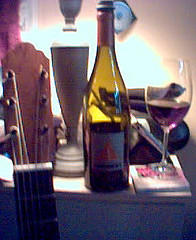
yum this is prety good has great legs, good bouquet, nice nose and opens very nicely. Had a bit of pepper at first but opened up and became smoth, I was not able to taste the oak. 15.99 at Joe Canals. You can find out more at http://www.artesawinery.com/index1.html
20050913
Music Stamp for Guitar Fret Board
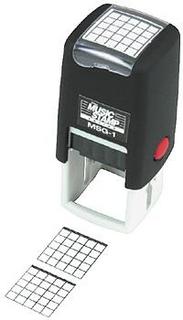
You can get these at www.musiciansfriend.com for 10.00 Instead of hand writing the Freet Board out you just stamp it.
20050912
20050909
20050908
20050907
going to record some this mouning
I will be trying to play some softer music this after noon. It will be very soft and tenter feel free to check it out at www.victortarassov.com I will call it "Tender 4 U" I hope some day to get to Granite Studio. thanks all of you for your support and encurgement.
A good combination, Ravens Wood 2001
20050906
Micing the Nylon Stringed Guitar (Ottmar Liebert)
The nylon-stringed Guitar......is acknowledged to be one of the hardest instruments to record, seriously! The top end of a nylon-stringed guitar is sort of velvety or silky and no pick-up I know does that justice. Compared to a steel-stringed guitar the nylon-strings are so subtle!!! A much more delicate in the mid-range and with a very tricky treble! And I feel that gets lost with a pick-up. I have tried the Baggs pick up systems, I have tried the RMC, and I have used the B-Band (in fact I am still listed as their endorser)...well, of those pick-ups mentioned, I truthfully do prefer the B-Band.....but in the end I have returned to just using a microphone, because I feel that the nylon strings need to breath and can only be reproduced with a microphone at this time. Of course a Digital microphone would be great, but I am very happy with my Neumann M149 in the studio and my Shure KSM 44 for live performances. Last year I used only the microphone for our performances and no pick-up whatsoever, and I am planning to do that again this year.
The nylon-stringed guitar is very intimate and small and probably the most unlikely instrument for a large venue! I remember how hard it was to be loud enough when we played with Santana in 1996...loud enough for 15,000 people to hear...well, of course all subtlety is lost in that context anyway....
One of my favorite performances is a private show I do at a California winery every couple of years. I play un-amplified in a wine-cellar in front of about 30 or 40 people - by invitation only. You could hear a needle drop, it is so quiet when I start playing...no microphone, no amplification, no speakers...and nothing to hide behind...this is the way a nylon-stringed guitar is meant to be heard....
Well, we are going to try to create that intimacy for you this year...it's that much harder for our engineer when I take away the pick-up, but Alan always rises to the challenge....
The nylon-stringed guitar is very intimate and small and probably the most unlikely instrument for a large venue! I remember how hard it was to be loud enough when we played with Santana in 1996...loud enough for 15,000 people to hear...well, of course all subtlety is lost in that context anyway....
One of my favorite performances is a private show I do at a California winery every couple of years. I play un-amplified in a wine-cellar in front of about 30 or 40 people - by invitation only. You could hear a needle drop, it is so quiet when I start playing...no microphone, no amplification, no speakers...and nothing to hide behind...this is the way a nylon-stringed guitar is meant to be heard....
Well, we are going to try to create that intimacy for you this year...it's that much harder for our engineer when I take away the pick-up, but Alan always rises to the challenge....
Jesses Cook's gear
JESSE COOK
On Vertigo, Jesse Cook played a Condé Hermanos flamenco guitar that he bought in Madrid in 1997. "I took about a week to pick out the guitar that I wanted," Cook says. "The Condé Hermanos won my heart. I tried all the guitars, and this is the most beautiful guitar that I heard while I was there. I love it."
Cook uses his Hermanos in the studio but says it's too fragile to take on the road. For live gigs, he uses either a nylon-string Godin Multiac or a Takamine classical cutaway CP-132SC. "The Multiac gives me access to synthesizers while I'm playing a nylon-string guitar," Cook explains, "and it has strong feedback resistance, which is great for performing on a big stage." He plays the Takamine in more intimate settings. This guitar has been modified with an RMC pickup—the same pickup that's in the Multiac. Cook also uses a Roland GR-9 guitar synthesizer and a Roland JV880 sound module for synth sounds in a live setting, as well as a T.C. Electronic G-Force effects processor.
Cook uses Luthier Concert Gold guitar strings on his Hermanos and D'Addario Pro-Arté hard-tension nylon strings on the Godin and the Takamine. "The Luthier strings are not as bright as the D'Addarios," Cook says. "They offer a more subtle sound, which is good because my style is a bit abrasive." He plays with either a custom-ordered Dunlop pick or his fingers (he treats his nails with superglue).
Cook records using a Bruel and Kjaer 4006 microphone. "It was originally designed for use as a reference tool for acoustic engineers because it was so accurate," Cook says. "Lately, audio engineers have been using it in the studio and finding it not only flat but very musical as well." He also sings the praises of Yamaha's 40-channel O2R mixing console, which features fully digital 32-bit mixing. "In the past, I was not a big fan of digital EQ or compression, but with the higher bit resolution, this machine is both pristine and warm at the same time," he says. For recording, Cook uses a Mac 9600 loaded with Logic Audio and Pro Tools as the audio engine.
On Vertigo, Jesse Cook played a Condé Hermanos flamenco guitar that he bought in Madrid in 1997. "I took about a week to pick out the guitar that I wanted," Cook says. "The Condé Hermanos won my heart. I tried all the guitars, and this is the most beautiful guitar that I heard while I was there. I love it."
Cook uses his Hermanos in the studio but says it's too fragile to take on the road. For live gigs, he uses either a nylon-string Godin Multiac or a Takamine classical cutaway CP-132SC. "The Multiac gives me access to synthesizers while I'm playing a nylon-string guitar," Cook explains, "and it has strong feedback resistance, which is great for performing on a big stage." He plays the Takamine in more intimate settings. This guitar has been modified with an RMC pickup—the same pickup that's in the Multiac. Cook also uses a Roland GR-9 guitar synthesizer and a Roland JV880 sound module for synth sounds in a live setting, as well as a T.C. Electronic G-Force effects processor.
Cook uses Luthier Concert Gold guitar strings on his Hermanos and D'Addario Pro-Arté hard-tension nylon strings on the Godin and the Takamine. "The Luthier strings are not as bright as the D'Addarios," Cook says. "They offer a more subtle sound, which is good because my style is a bit abrasive." He plays with either a custom-ordered Dunlop pick or his fingers (he treats his nails with superglue).
Cook records using a Bruel and Kjaer 4006 microphone. "It was originally designed for use as a reference tool for acoustic engineers because it was so accurate," Cook says. "Lately, audio engineers have been using it in the studio and finding it not only flat but very musical as well." He also sings the praises of Yamaha's 40-channel O2R mixing console, which features fully digital 32-bit mixing. "In the past, I was not a big fan of digital EQ or compression, but with the higher bit resolution, this machine is both pristine and warm at the same time," he says. For recording, Cook uses a Mac 9600 loaded with Logic Audio and Pro Tools as the audio engine.
20050905
Paco de Lucía (Got this from Ottmar Lieberts sight)
I could not live without the guitar, but at the same time this is no way of life, because it is such a difficult instrument, so ungrateful; you dedicate your whole life to it, hours and days, and suddenly you come up on stage, and that day you feel in perfect shape for playing, and still you don't hit one single string right, and you cannot figure out why... it depends on so many things, on how long your fingernails are... I am talking about tenths of millimeters, and you ask yourself. What is going on? Where am I failing? And it could be a badly polished nail... it's a f*cker of an instrument. Once I was drunk, in New York, and I went up on stage in a jazz club to play the electric guitar, and when I got down my nails were all broken by the steel strings ...and now ...never again.
When I was twenty years old I thought that when I would reach the age of fifty I would find peace of mind, but each day I am more confused, more lost, as your knowledge span is broadened you feel more insecure, you see that everything is relative and that you know less of everything; now I miss that age of twenty when I really felt like Superman and thought that I had everything.
Everything that one lives fills one with sensations, the pain when it is at its most profound...makes your sensibility get used to pain being so deep, and thus the happiness is also felt at its deepest. In some way there is a relationship between what you compose, what you write or play, the things through which you have felt; if you have felt a very deep pain, that is somehow reproduced when you compose. Flamenco is full of this, of pain, of sorrow, of the persecution of the gypsy people, the condion of being left out, Andalucia and poverty, and of hunger.
There are many people who boast of having endured hunger, but I did not suffer hunger, my father made sure that we would not go hungry, but we had just enough to live, and that is positive for any artist.
Whatever you choose to work in, we are in a society in which the levels, the standards have been set so high, that if you really want to become someone you have to become something as horrible as is being specialized in an area and dedicating your life to this; get locked up in a room to strain your brains, to try to reach the highest level possible.
This is basically a guitar album, a flamenco album in the traditional manner but with percussion, a lute here or there, a mandolin...Antonio Carmona plays the "cajon" in a buleria; in my opinion Antonio is the one who plays the "cajon" best of all... there is also Tino di Geraldo, Benavent and a Duquende, a cantaor whom I like very much and who did some very beautiful tangos.
I don’t know if this is the ¨most¨ deeply felt album... it is deeply felt because each album is a very painful delivery. Every time I record an album I truly go crazy, I am filled with anxiety, fear and insecurity, and I always think that it is worthless and throw more than half the compositions in the trash...it becomes an illness, recording an album becomes an illness, I suffer terribly.. suddenly I come up with a line that I enjoy thoroughly and for five minutes I can be the happiest person in the world, but after those five minutes insecurity and fear and uncertainty come back. What am I doing here when I could be enjoying the sunshine of the beach? I have enough money so as to not need to be straining my brain any more, but there comes a time in which I tell myself that I have to keep fighting and struggling to stay alive, so that I feel that I am still alive and with something to say.
Now I am left with the satisfaction that within the next two or three years, at least...I don’t have to lock myself up to record another album.
I could not live without the guitar, but at the same time this is no way of life, because it is such a difficult instrument, so ungrateful; you dedicate your whole life to it, hours and days, and suddenly you come up on stage, and that day you feel in perfect shape for playing, and still you don’t hit one single string right, and you cannot figure out why... it depends on so many things, on how long your fingernails are... I am talking about tenths of millimeters, and you ask yourself. What is going on? Where am I failing? And it could be a badly polished nail... it’s a fucker of an instrument.
Once I was drunk, in New York, and I went up on stage in a jazz club to play the electric guitar, and when I got down my nails were all broken by the steel strings ...and now ...never again.
I am not interested in it, there is still a lot to be done with the Spanish guitar.
Playing the electric guitar is interesting, because with the acoustic you play a note and it fades out almost immediately, while with the electric you can spend ten minutes with that same note, and that means that it gives you much more tranquility to play, while that note is sounding you have time to think about what you will do next...with the Spanish one you have to play the next note immediately, because the sound goes mute much faster.
I find this much more difficult.
I don’t have a good relationship with the guitar; as an instrument, it’s got an ugly character, I can truly say that I dislike it.
We flamenco guitar players are not very good in expressing ourselves with words, because we are a bit savage, we are people who have been brought up in a room, locked in, alone, without talking, we do not have a facility of speech. If you lend me a guitar I can stay here until tomorrow telling you things, but I am not used to expressing myself with words. I envy my friend Felix Grande. When I listen to him speak it is the thing which I most admire in the world, possessing eloquence, having wit in telling something. I have spent over half my life playing an instrument to be able to tell something, when I feel secure to some extent is when I have a guitar in my hands.
Flamenco has always been considered a third category type of music, and maybe I am placing it too highly at that. It was always the music of the gypsies, of Andalucians, of the people of the pubs. Something which can summarize this well is a memory of someone who once said in my village, "Paco de Lucia is really a master, he plays the guitar extremely well", and another one of my neighbors who was there retorted, "what are you saying, man, he cannot play so well, I know him since he was a child, and he even came to my house to eat and his head was full of spots". What I mean by this is that people have the sense that that which is ours is worthless, this happens here and in any other country, that which is local, folkloric, is not valued; it is cooler to go to a rock concert, no matter how bad it is, than to go see a guy that plays the ¨charango¨ (small South American guitar), which is marvellous.
I have played abroad since I was twelve years old, and in a way you open the doors for the people who are up and coming; here (in Spain) there is not work enough for all the good artists within the flamenco scene, because there are wonderful people, people who are making music that no one else can do in the whole country, not like those singers and little groups that do awful things and sell 500,000 copies of their first album, while another young guy has been suffering for years to gain enough to live, even though what he does is of a much higher quality.
When I was twenty years old I thought that when I would reach the age of fifty I would find peace of mind, but each day I am more confused, more lost, as your knowledge span is broadened you feel more insecure, you see that everything is relative and that you know less of everything; now I miss that age of twenty when I really felt like Superman and thought that I had everything.
Everything that one lives fills one with sensations, the pain when it is at its most profound...makes your sensibility get used to pain being so deep, and thus the happiness is also felt at its deepest. In some way there is a relationship between what you compose, what you write or play, the things through which you have felt; if you have felt a very deep pain, that is somehow reproduced when you compose. Flamenco is full of this, of pain, of sorrow, of the persecution of the gypsy people, the condion of being left out, Andalucia and poverty, and of hunger.
There are many people who boast of having endured hunger, but I did not suffer hunger, my father made sure that we would not go hungry, but we had just enough to live, and that is positive for any artist.
Whatever you choose to work in, we are in a society in which the levels, the standards have been set so high, that if you really want to become someone you have to become something as horrible as is being specialized in an area and dedicating your life to this; get locked up in a room to strain your brains, to try to reach the highest level possible.
This is basically a guitar album, a flamenco album in the traditional manner but with percussion, a lute here or there, a mandolin...Antonio Carmona plays the "cajon" in a buleria; in my opinion Antonio is the one who plays the "cajon" best of all... there is also Tino di Geraldo, Benavent and a Duquende, a cantaor whom I like very much and who did some very beautiful tangos.
I don’t know if this is the ¨most¨ deeply felt album... it is deeply felt because each album is a very painful delivery. Every time I record an album I truly go crazy, I am filled with anxiety, fear and insecurity, and I always think that it is worthless and throw more than half the compositions in the trash...it becomes an illness, recording an album becomes an illness, I suffer terribly.. suddenly I come up with a line that I enjoy thoroughly and for five minutes I can be the happiest person in the world, but after those five minutes insecurity and fear and uncertainty come back. What am I doing here when I could be enjoying the sunshine of the beach? I have enough money so as to not need to be straining my brain any more, but there comes a time in which I tell myself that I have to keep fighting and struggling to stay alive, so that I feel that I am still alive and with something to say.
Now I am left with the satisfaction that within the next two or three years, at least...I don’t have to lock myself up to record another album.
I could not live without the guitar, but at the same time this is no way of life, because it is such a difficult instrument, so ungrateful; you dedicate your whole life to it, hours and days, and suddenly you come up on stage, and that day you feel in perfect shape for playing, and still you don’t hit one single string right, and you cannot figure out why... it depends on so many things, on how long your fingernails are... I am talking about tenths of millimeters, and you ask yourself. What is going on? Where am I failing? And it could be a badly polished nail... it’s a fucker of an instrument.
Once I was drunk, in New York, and I went up on stage in a jazz club to play the electric guitar, and when I got down my nails were all broken by the steel strings ...and now ...never again.
I am not interested in it, there is still a lot to be done with the Spanish guitar.
Playing the electric guitar is interesting, because with the acoustic you play a note and it fades out almost immediately, while with the electric you can spend ten minutes with that same note, and that means that it gives you much more tranquility to play, while that note is sounding you have time to think about what you will do next...with the Spanish one you have to play the next note immediately, because the sound goes mute much faster.
I find this much more difficult.
I don’t have a good relationship with the guitar; as an instrument, it’s got an ugly character, I can truly say that I dislike it.
We flamenco guitar players are not very good in expressing ourselves with words, because we are a bit savage, we are people who have been brought up in a room, locked in, alone, without talking, we do not have a facility of speech. If you lend me a guitar I can stay here until tomorrow telling you things, but I am not used to expressing myself with words. I envy my friend Felix Grande. When I listen to him speak it is the thing which I most admire in the world, possessing eloquence, having wit in telling something. I have spent over half my life playing an instrument to be able to tell something, when I feel secure to some extent is when I have a guitar in my hands.
Flamenco has always been considered a third category type of music, and maybe I am placing it too highly at that. It was always the music of the gypsies, of Andalucians, of the people of the pubs. Something which can summarize this well is a memory of someone who once said in my village, "Paco de Lucia is really a master, he plays the guitar extremely well", and another one of my neighbors who was there retorted, "what are you saying, man, he cannot play so well, I know him since he was a child, and he even came to my house to eat and his head was full of spots". What I mean by this is that people have the sense that that which is ours is worthless, this happens here and in any other country, that which is local, folkloric, is not valued; it is cooler to go to a rock concert, no matter how bad it is, than to go see a guy that plays the ¨charango¨ (small South American guitar), which is marvellous.
I have played abroad since I was twelve years old, and in a way you open the doors for the people who are up and coming; here (in Spain) there is not work enough for all the good artists within the flamenco scene, because there are wonderful people, people who are making music that no one else can do in the whole country, not like those singers and little groups that do awful things and sell 500,000 copies of their first album, while another young guy has been suffering for years to gain enough to live, even though what he does is of a much higher quality.
20050904
20050903
20050902
Dalai Lama one of his favorite qotes
For as long as space enduresAnd for as long as living beings remain,Until then may I too abideTo dispel the misery of the world
Question
Never doubt that a small group of thoughtful, committed citizens can change the world. Indeed, it is the only thing that ever has.
Subscribe to:
Comments (Atom)

